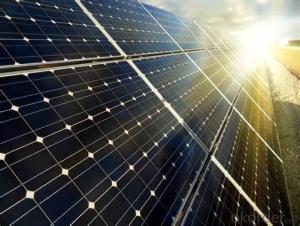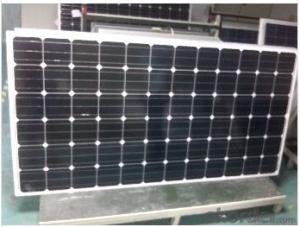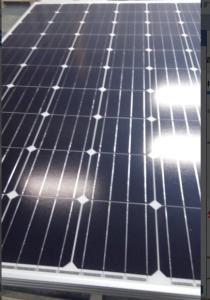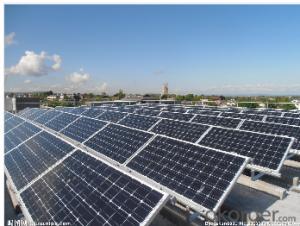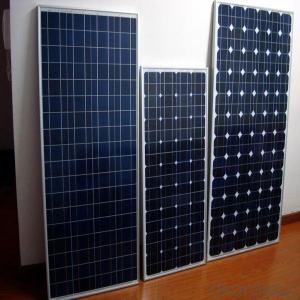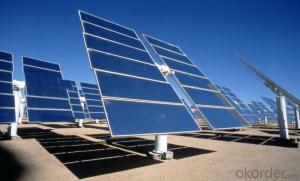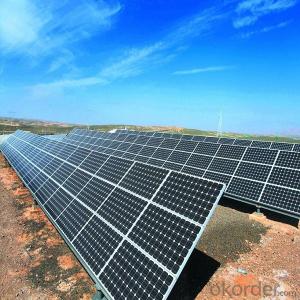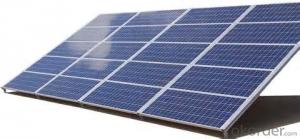Caterpillar Polycrystalline Solar Panels 290W High Efficiency
- Loading Port:
- China main port
- Payment Terms:
- TT OR LC
- Min Order Qty:
- 1000 watt
- Supply Capability:
- 1000000 watt/month
OKorder Service Pledge
OKorder Financial Service
You Might Also Like
Specification
Introduction of Poly solar panels CNBM
Polycrystalline Solar Panels 290W With High Efficiency
CNBM Solar photovoltaic (PV) Panel is designed for large electrical power requirements. It is the optimal choice for both on-grid and off-grid power systems. CNBM Solar panel offers high performance of power per square foot of solar array. Monocrystalline silicon(c-Si): often made using the Czochralski process. Single-crystal wafer cells tend to be expensive, and because they are cut from cylindrical ingots, do not completely cover a square solar cell module without a substantial waste of refined silicon. Hence most c-Si panels have uncovered gaps at the four corners of the cells.
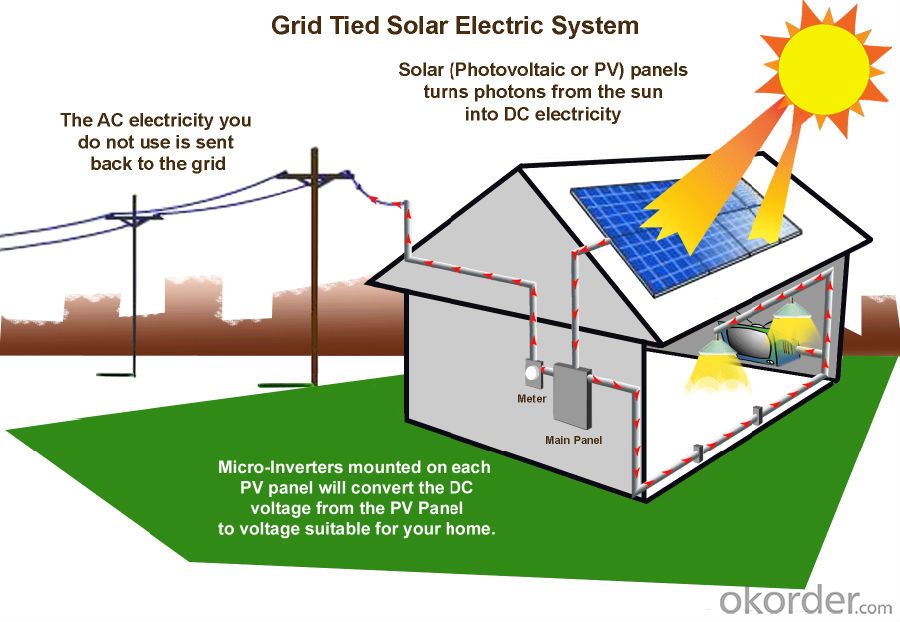
Feature
1.Solar Cell : High efficiency crystalline solar cell. Even if under the weak light, the solar module can produce maximum power output.
2.Tempered glass (toughened glass): Anti-reflecting coating and high transmission rate glass increase the power output and mechanical strength of solar module.
3.EVA and TPT: Using high quality EVA and TPT to prevent destroying and water.
4.Long lifetime: ≥25 years; Less power decrease.
5.Resisting moisture and etching effectively, not effected by geology.
6.The certificate issued by international authority: UL, TUV, IEC, VDE, CE.
Specification
Characteristics of Poly solar panels CNBM | |||||
Max Power Voltage Vmp(V) | 30.3 | 30.8 | 31.1 | 31.4 | 31.85 |
Max Power Current Imp(A) | 7.60 | 7.64 | 7.73 | 7.81 | 7.85 |
Open Circuit Voltage Voc(V) | 36.1 | 36.6 | 37 | 37.3 | 37.68 |
Short Circuit Current Isc(A) | 8.50 | 8.55 | 8.65 | 8.75 | 8.85 |
Max Power Pm(W) | 230W | 235W | 240W | 245W | 250W |
Temperature Coefficient of Cells Poly solar panels CNBM | |
NOCT | 45℃ ± 2℃ |
Temperature Coeffucients of Isc (%/℃) | 0.0492 |
Temperature Coeffucients of Voc (%/℃) | -0.3374 |
Temperature Coeffucients of Voc (%/℃) | -0.4677 |
Mechanical Data of Poly solar panels CNBM | |
Dimension | 1638 × 982 × 40 mm |
Weight | 19.5 kg |
No. of Cells and Connections | 60 (6 ×10) |
Tolerance | 0 ~ + 5 W |
Cell | Monocrystalline Cell 156 × 156 mm |
Packing | 624 Pcs/40ft(H) Container |
Limits of Poly solar panels CNBM | |
Operating Temperature | -40℃ to +85℃ |
Storage Temperature | -40℃ to +85℃ |
Max System Voltage | 1000VDC(IEC) / 600VDC(UL) |
Guarantees of Poly solar panels CNBM | |
Products Guarantee | 12 yrs free from defects in materials and workmanship |
Performance Guarantee | No less than 90% within 10yrs and no less than 80% within 25yrs |
Certificates | TUV(IEC61215&IEC61730),VDE(IEC61215&IEC61730),UL,CE |
Packaging Information
Package:26pcs/box
Quantity:1 box/pallent
Loading Capacity:952pcs/40ft
- Q: Do higher watt solar panels last longer, efficiency-wise? 3 installers gave me quotes with 3 different sunpower panels. The 225, 25, 20 watt panels. Whats the con and pro's of the different wattages?
- Power from solar panels depends upon its proper installation and the brightness of the Sun.
- Q: Do solar panels require maintenance?
- Yes, solar panels do require maintenance. Regular cleaning to remove dirt, dust, and debris is necessary to ensure optimal efficiency. Additionally, periodic inspections and maintenance checks are recommended to identify and address any potential issues such as loose connections, wiring problems, or shading that may affect performance. However, compared to other forms of energy generation, solar panels require relatively low maintenance efforts.
- Q: Well I was thinking about the idea of renovating either a smaller school bus or building a tiny house and I was wondering if i can get some information on the size and watts panel should I use or more like how to get that whole solar energy in motion. Any infor and links would help
- I think that typical solar panels are 2'x4' and produce something like 800-000 wh per day. (That's 0.8 - kwh per day.) More in the summer, less in the winter, if they're aimed sort of at the sun. There are newer, more expensive panels that produce more. There are also thin film panels that are less expensive, and probably more sturdy. You then have a couple choices. In a house, you'd have an expensive inverter to connect to the utility power, so you can have power at night when your panels aren't generating anything. In a trailer, you want 2-4-6 deep cycle car batteries to store the power. Then you could have an inverter to convert that power to 20v AC, so you could use normal appliances. Or, you could buy appliances that run on 2 volts DC. Maybe a combination of both. You'll need to figure out how much power you're going to use, so you know how many panels and batteries you're going to need. The calculation is easy. Figuring out how much power you need is hard. You need deep cycle batteries because you can repeatedly charge them way up and run them way down. Ordinary batteries die fairly quickly when you do that.
- Q: Can I fet free solar panels. This site okorder sells a book that tells how to, but I ordered tha book more then a year a go, and in never came. I even sent them a email a day for more then 3 months and never heard back from them. If anyone knows how to get free pannels, please let me know how. A $300.00 a month bill is slowly killing me.
- Try approaching a few power suppiers to find out if they have any scheme or grants available. Or contact a local DIY store/builders merchants and ask if you can have some panels installed and agree to advertising allowing them to let people contact you for your opinion on the panels.
- Q: Exactly How much power will this kit produce? for example. Will it only be able to power the 2 light throughout an entire day or would it be able to power a couple TV's with a couple lights. Or a Refrigerator? washer dryer? I'm just wondering exactly what it will be able to do and if it's worth paying $200 for if it'll only power two lights. Don't get me wrong, That's great and will make a difference but i'm looking for something that will make a little bit of a bigger difference. Would the 80 watt monocrystalline solar panel be much better? if so, what would it be able to power? double?
- I don't have direct experience with the Harbor Freight panels, but have heard that they are agressively rated - i.e., the three 5-watt panels are really 5-watt panels. The 80-watt panel is likely to be a serious panel, rated according to standard test conditions. It will also be more durable, and probably have a warranty of 20 years or more. There's really no comparison. If your goal is to experiment with solar electricity, then get the kit from Harbor Freight (or Northern Tool, or any of a handful of other places). If your goal is to save money, generally you will need a larger scale than 80 watts - several thousand watts being the norm. And the payback time will be measured in years.
- Q: im aware i dont fully understand. but with what i do. if P = iv, and current changes with voltage, whats the point of changing either. if in any cicumstance, you end up with the same wattage, how does changing either effect a solar setup. (2v panel vs 24v)thanks in advance. explain in laymans if you can.
- The choice of solar panel voltage comes down more to what the panels will be connected to. You're right that power can remain the same at the different voltages. Higher input (panel) voltages are sometimes used in inverter systems to reduce the effect of voltage draw-down. 2v panels (about 20v open circuit) work well for charging 2v batteries, connected in parallel, through a charge controller. For use of a grid-tie inverter, higher input voltages are sometimes used to reduce the effects of draw-down. You want to select and wire (parallel vs. series) your panels based on the input voltage requirement of the load, whatever it may be.
- Q: I just bought a quot;00 wattsolar panel system to install on my house. I just wanted to know if by 00 watts, does that mean per hour, min, day week or what?
- It means that it will deliver 00 watts of energy. Assuming correct voltages, etc. you could connect a 00W incandescent lamp and it will work just fine. So it is the instantaneous output of the panel. Storage is more typically measured in the watt/hour manner - identifying capacity rather than immediate availability. If you have 000 watt/hours of stored energy then you can run your 00W lamp for 0 hours - or two 00W lamps for 5 hours. See? It's simple.
- Q: I live in Los Angeles area, I see the ads that, they will install solar panel for $0. I would like to know what is the catch ?Thanks You.
- Generally, you still get charged for the panels themselves, just the install is free, or they might make you buy a specific amount to get the install free.
- Q: How do solar panels impact the electricity bill?
- Solar panels can significantly reduce or even eliminate electricity bills by generating clean and renewable energy from the sun. By harnessing solar power, homeowners can offset their electricity usage with the electricity produced by the panels, resulting in lower overall energy costs.
- Q: I have a solar panel that puts out 00v, .5 amps in full sun. Before I thought it would charge a 2v battery without a solar charger but then I talked to someone and they said that it was wasting a lot of power and could potentially hurt the battery. A second part to this question is what happens if I put it on a 72v battery without a controller. Thanks!
- Guide okorder /
Send your message to us
Caterpillar Polycrystalline Solar Panels 290W High Efficiency
- Loading Port:
- China main port
- Payment Terms:
- TT OR LC
- Min Order Qty:
- 1000 watt
- Supply Capability:
- 1000000 watt/month
OKorder Service Pledge
OKorder Financial Service
Similar products
Hot products
Hot Searches
Related keywords
